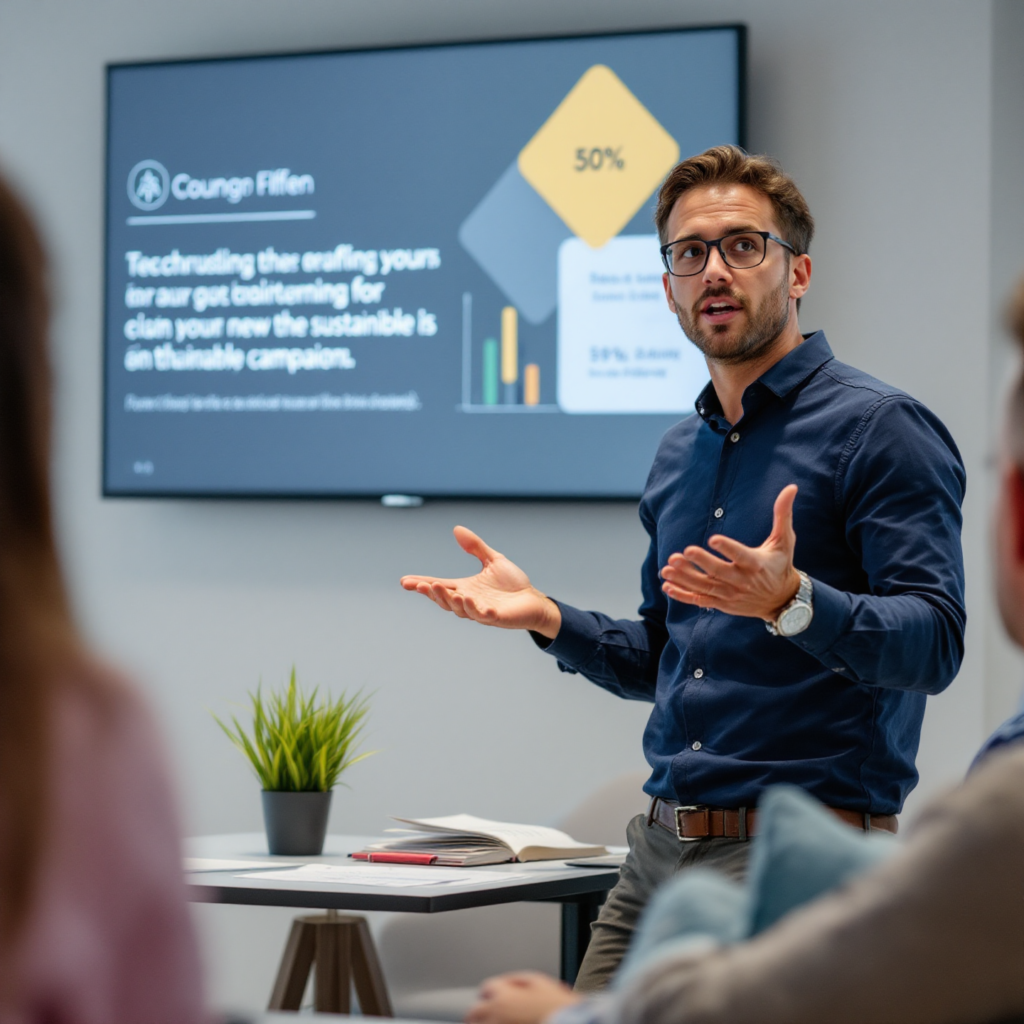In today’s fast-paced business world, crafting compelling presentations and proposals is essential for success. But the process can be time-consuming and stressful. What if you could streamline this process, anticipate tough questions, and deliver presentations with more confidence? In this blog post, we’ll explore how AI tools like ChatGPT are revolutionizing how professionals prepare and present their ideas, using a real-world example of a marketing manager named Steve.

Steve’s Challenge: Preparing a pitch-perfect proposal
Steve, a marketing manager, was tasked with preparing a proposal for his company’s board of directors for a new sustainable technology campaign. He needed to ensure his presentation was “rock solid” to secure buy-in. Like many professionals, Steve faced the challenge of anticipating tough questions and refining his arguments effectively.
AI as a Virtual Sounding Board: ChatGPT’s Role
To tackle this, Steve turned to ChatGPT, using it as a “virtual senior executive”—an AI persona designed to challenge his ideas with rigorous, board-level questions. This innovative approach allowed him to anticipate concerns and refine his arguments before the actual meeting, saving him significant time and effort.
Stress-Testing Ideas and Strengthening Arguments
One key benefit Steve experienced was the ability to stress-test his proposals. For example, when he proposed a $50,000 budget increase, ChatGPT pushed back with challenging questions:
- “How do you justify the budget increase when the current ROI for digital campaigns is below industry benchmarks?”
- “Have you explored cost-effective alternatives?”
- “What metrics will you track to prove this investment is worthwhile?”
These probing questions forced Steve to solidify his arguments and ensure he had strong data to support his proposal.
Improving Risk Assessment and Contingency Planning
ChatGPT also proved invaluable in reviewing Steve’s risk assessments. When Steve projected a 20% increase in consumer engagement, the AI prompted him to consider:
- “What factors support that projection—past data or market research?”
- “What’s your backup plan if engagement stalls?”
This process enabled Steve to clarify his assumptions and develop contingency plans, ensuring he was well-prepared for any scenario.
Refining Presentations for Maximum Impact
Beyond strengthening his arguments, Steve used ChatGPT to refine his slide deck. When his original presentation included a dense 12-month performance chart, ChatGPT suggested simplifying it by highlighting three key metrics with visuals and concise takeaways. These changes resulted in clearer and more impactful slides.
Scenario Planning and Boosting Confidence
Furthermore, ChatGPT assisted Steve with scenario planning by predicting potential board questions and helping him prepare responses for best-case, worst-case, and expected outcomes. This level of preparation significantly boosted Steve’s confidence going into the meeting.
Efficiency Gains: From Weeks to Days
Steve highlights the significant efficiency gains he achieved using AI. Previously, he would spend weeks fine-tuning his arguments and slides, but with ChatGPT’s assistance, he streamlined the process into just days.
The Human Element: Balancing AI with Expertise
However, Steve emphasizes that he doesn’t rely on AI alone. He stresses the importance of balancing AI insights with feedback from colleagues who possess specific knowledge of the board’s expectations. This combination allows him to leverage both AI-driven efficiency and human expertise.
The Payoff: Confidence and Stronger Proposals
The results of Steve’s approach were clear: a well-prepared, confident pitch that withstood scrutiny. He concludes that using AI in this way has saved him time, strengthened his proposals, and enhanced his overall presentation skills.
Key Takeaways for Professionals
Steve’s experience provides valuable insights for professionals looking to leverage AI in their workflows:
- AI as a Thought Partner: AI tools can act as valuable thought partners, challenging your assumptions and helping you refine your ideas.
- Efficiency Boost: AI can significantly streamline time-consuming tasks, freeing up time for strategic thinking and creativity.
- Enhanced Preparation: AI can help you anticipate questions, identify potential weaknesses, and prepare comprehensive responses.
- Human Oversight is Crucial: It’s essential to balance AI insights with human judgment, experience, and collaboration.
By embracing AI tools thoughtfully, professionals can elevate their work, improve their efficiency, and achieve greater success in their endeavors.
Steve’s story is just one example of how AI can be a powerful work assistant. But we know the possibilities are vast and ever-evolving. We’d love to hear from you: How are you harnessing the power of AI to boost your productivity or enhance your work? Share your experiences, tips, and even any challenges you’ve encountered in the comments below. Let’s learn from each other and navigate the future of work together!”
